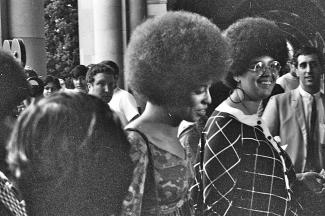
Black students attending UCLA’s prestigious film school in 1969 couldn’t believe the news.
The Watts race riots and a shoot-out on campus had brought forth a huge opportunity to explore important issues through art. So … why was Hollywood closing its eyes to such crises?
As racial tensions rose down the block, Hollywood instead did what it does best.
The racist, stereotypical tropes of the day - coons, mammies, bucks - continued to thrive, but that didn’t stop future directors like Julie Dash and Charles Burnett from issuing a risky ultimatum to the Hollywood machine.
Members of what would later be dubbed the LA Rebellion demanded the tools and freedom to create art that elevated the complex humanity of Black people, far beyond the caricatures the studios loved.
When it became clear the rebels were committed to shaking up the status quo - no matter the cost to their careers - faculty offered back up.
UCLA philosophy instructor Angela Davis pushed them to remain authentic and pass along their principles to the next class.
The result was a TWENTY YEAR streak of bold, Black independent filmmaking that challenged Hollywood at its core.
The most notable films include “Killer of Sheep,” Daughters of the Dust,” and “Sankofa.”
The LA Rebellion’s legacy continues to influence many Black artists today who wish to challenge the status quo and tell stories that truly represent the desires, frustrations, and beliefs of the Black community in ways Hollywood could never imagine.